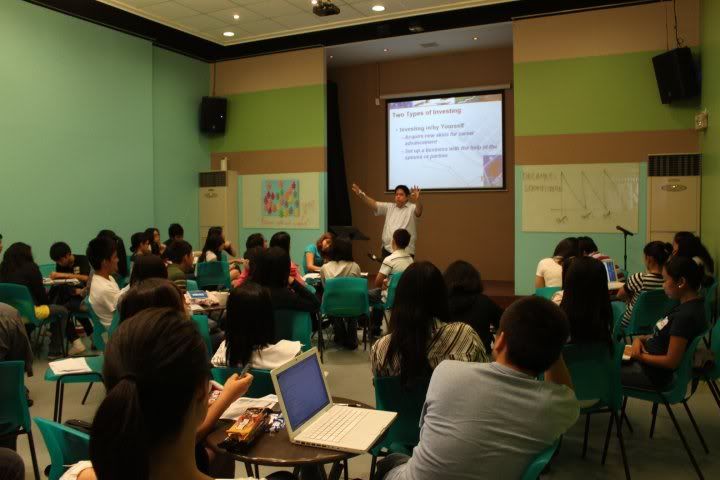My advocacy, part 2
By Randell Tiongson on June 1st, 2010… Con’t.
Blue Chip was my first salvo into teaching finance for the youth. My Pastor (Dennis Sy) and I were discussing on what we can do with the youth and how to prepare them for the future and the idea of Blue Chip was born. Allow me to share with you the blog of one of the participants of Blue Chip, Louis Moran:
—————–
“What did those speakers teach me?”
A Better way to Save
Record your Money
Make a cash flow chart: Use excel or, for manual computers, a paper with a simple data table. A small table you can keep on your planner to record daily expenditures and another to record expenditures on a monthly basis. They should record each individual expense – item, date of transaction, money lost; something like that. And it should be brutally REAL. A monthly record should have a totals vs. monthly income/allowance table, plus, savings, on the bottom. Those savings can be how much you don’t actually spend, if any. And it shouldn’t be discarded immediately; review it, keep it for the next month or two, and then make another one. And remember to keep receipts.
Plan your Money
Whatever my priority is, knowing what I need to spend daily, I can plan my expenditures– a certain amount for leisure, another for more important things like baon or jeepney fares, and a portion to save. I can save just for the hell of it – i’ll have money to spend for friend’s birthdays or special gigs – or tighten my budget for a certain goal (something you have to get within a certain time, like a test tube set for your school project due next month)
Store your Money
– Some say piggy bank but it also seems like a good idea to start using a savings account, or a bank. It isn’t just storing, it’s investing, though, with little growth (like microbial).
And that’s one thing I learned from the seminar. I knew I needed to save money, except I didn’t exactly have an efficient way which is how my money always disappeared. Bottom line of this lesson is keep track of your money not just by memory. From personal experience, high-school life is the best time to start using organizers – those little notebooks, applications on your mobile phone with a calendar icon, or even your personal computer (Applications like iCal or Entourage). A cash-flow chart is just one of those.
What did they teach me about using money?
Bottom line is the best idea is always an investment.
Invest on Business
‘Make your money work for you, not the other way around’ – quote on quote. Do something you love to do and you’re good at, or something that everybody really wants or needs, like a real opportunist! But in any of the three, something legal of course. The best example for me were the Fausto brothers who were stock traders and business investors at 13 to… how old? 18? They showed us how capable we, the teenagers at the adult’s talk, could do all that even at our age; as well as do business or be opportunists.
On Yourself
Study hard/learn skills. (Another thing I learned, but from other, older people’s experience: do this before the high-school fun ends and they all become serious, stressful studying, board exams, summer enrichment – well, that’s not so bad – and minoring and majoring)
Invest on others
——————–
High School student Louis Moran seems to have learned much from his 2 day experience with us. Things like this encourage me further with my advocacy.
“for attaining wisdom and discipline; for understanding words of insight; for acquiring a disciplined and prudent life, doing what is right and just and fair; for giving prudence to the simple, knowledge and discretion to the young – let the wise listen and add to their learning, and let the discerning get guidance-“ Proverbs 1:2-5, NIV


